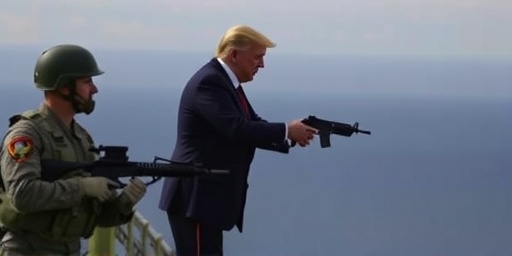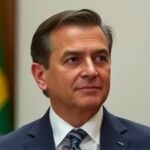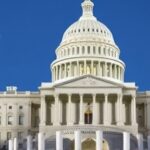In a bold pivot that has stunned international observers, the Trump administration has authorized a dramatic escalation of military operations in Venezuela, moving from shadowy CIA-backed covert actions to overt deployments of naval and air forces in the Caribbean. This shift, announced late Thursday by Pentagon officials, involves the positioning of two carrier strike groups and advanced fighter squadrons just off Venezuela‘s coast, aimed at pressuring the regime of President Nicolás Maduro to step down amid crippling economic sanctions and widespread humanitarian crises.
- Naval Strike Groups Deployed: A Visible Show of U.S. Might
- CIA Operations Greenlit: From Intelligence Gathering to Active Intervention
- Maduro’s Defiant Stand: Rallying Allies Against U.S. ‘Imperialism’
- Global Ripples: Allies and Adversaries React to the Escalation
- Future Horizons: What Lies Ahead for U.S.-Venezuela Standoff
The decision marks a significant departure from previous U.S. strategies, which relied heavily on economic isolation and support for opposition figures like Juan Guaidó. Sources within the Trump administration indicate that intelligence reports of Maduro’s deepening ties with Russia and Iran— including alleged arms shipments and cyber operations—prompted the urgent response. “We can no longer afford to play games in the shadows,” a senior White House official told reporters on condition of anonymity. “The Maduro regime’s actions threaten regional stability, and it’s time for a show of strength.”
Venezuela, once the richest nation in South America due to its vast oil reserves, has spiraled into chaos under Maduro’s rule since 2013. Hyperinflation reached 1,698,488% in 2018, according to the International Monetary Fund, displacing over 7.7 million people—many fleeing to neighboring Colombia and Brazil. The U.S. has imposed sanctions on more than 200 Venezuelan officials and entities, freezing assets worth billions, but Maduro has clung to power through alliances with authoritarian allies.
Naval Strike Groups Deployed: A Visible Show of U.S. Might
The cornerstone of this escalation is the deployment of the USS Gerald R. Ford and USS Nimitz carrier strike groups to the waters surrounding Venezuela. Each group comprises over 7,500 sailors, dozens of aircraft including F-35 stealth fighters, and guided-missile destroyers capable of launching Tomahawk cruise missiles. Pentagon spokesperson John Kirby confirmed the movements during a briefing, stating, “These assets are positioned to deter aggression and protect U.S. interests in the hemisphere.”
This isn’t mere posturing; reconnaissance flights by P-8 Poseidon aircraft have already begun, monitoring Venezuelan military installations along the Orinoco River and in the strategic Guayana region. Satellite imagery analyzed by the Center for Strategic and International Studies shows increased activity at Venezuelan ports, where Russian-flagged vessels have been docking to unload military equipment. U.S. military officials estimate that these deployments could sustain operations for months, with refueling stops planned at U.S. bases in Puerto Rico and the U.S. Virgin Islands.
Experts point to historical precedents, like the 1962 Cuban Missile Crisis, where naval blockades forced Soviet withdrawal. “The Trump administration is drawing a line in the sand,” said Dr. Elena Vargas, a Latin American security analyst at Georgetown University. “By making this overt, they’re signaling to Maduro that covert support from Moscow won’t go unchecked.” The move has already spiked oil prices by 3% on global markets, as traders fear disruptions to Venezuela’s 1.5 million barrels per day production, much of which is shipped through the Caribbean.
CIA Operations Greenlit: From Intelligence Gathering to Active Intervention
Parallel to the military buildup, the Trump administration has expanded CIA activities inside Venezuela, authorizing what officials describe as “enhanced operational support” for anti-Maduro forces. This includes drone surveillance over Caracas and the provision of secure communications to opposition networks, according to leaks from congressional briefings. The CIA, long involved in covert ops since the agency’s founding in 1947, has ramped up its presence following a classified directive signed by President Trump last month.
Historically, the CIA’s role in Latin America has been controversial—from the 1954 Guatemala coup to support for Nicaraguan Contras in the 1980s. In Venezuela, past efforts focused on funding dissidents and cyber disruptions to state media like Telesur. Now, with overt military backing, these activities could evolve into direct sabotage of Maduro’s security apparatus, including the notorious SEBIN intelligence service, accused by Human Rights Watch of detaining over 15,000 political prisoners since 2014.
A former CIA operative, speaking to The New York Times, revealed that teams are embedding with Venezuelan exiles training in Colombia. “The authorization changes everything,” the source said. “We’re not just watching anymore; we’re enabling regime change.” This escalation aligns with the Trump administration’s broader “maximum pressure” campaign, which has seen U.S. indictments against Maduro for narcotrafficking, alleging his regime shipped 200 tons of cocaine to the U.S. annually through alliances with Colombian FARC rebels.
Critics, including Amnesty International, warn of blowback. “Authorizing CIA ops in this climate risks turning Venezuela into a proxy war zone,” said executive director Margaret Huang. Yet, supporters argue it’s a necessary response to Maduro’s crackdowns, where security forces have killed at least 200 protesters since 2019, per the Venezuelan Observatory of Violence.
Maduro’s Defiant Stand: Rallying Allies Against U.S. ‘Imperialism’
President Nicolás Maduro wasted no time in responding to the U.S. escalation, branding it an “act of Yankee imperialism” during a fiery speech from the Miraflores Palace. Flanked by military generals, Maduro vowed to defend Venezuela’s sovereignty, invoking Simón Bolívar’s legacy against foreign meddling. “We will not bow to the gringo warships,” he declared, as state television broadcast images of Venezuelan Su-30 fighter jets scrambling for patrols.
The Maduro regime, backed by a loyal military elite that controls key oil revenues, has turned to Russia and China for support. Moscow has delivered S-300 air defense systems and stationed 200 Wagner Group mercenaries in the country, while Beijing holds $60 billion in Venezuelan debt. In recent weeks, Iranian oil tankers have evaded U.S. sanctions to refuel Maduro’s fleet, complicating the Trump administration’s naval strategy.
Domestically, Maduro is mobilizing: Conscripts are being trained in urban warfare, and cyber units—allegedly aided by North Korean hackers—have launched DDoS attacks on U.S. government websites. Polls by Datanalisis show Maduro’s approval at a dismal 15%, but his control over the National Electoral Council ensures rigged elections, as seen in the disputed 2018 vote where turnout was questioned at under 50%.
Opposition leader Juan Guaidó, recognized by the U.S. and 50 other nations as interim president, praised the escalation from exile in Colombia. “This is the international community’s wake-up call to end the dictatorship,” he tweeted, garnering 2 million views. Yet, fractures within the opposition—exacerbated by arrests of key figures like Leopoldo López’s allies—pose challenges to any coordinated push.
Global Ripples: Allies and Adversaries React to the Escalation
The U.S. moves have ignited a firestorm of international reactions, testing alliances in the Western Hemisphere. Canada and the European Union echoed support for pressuring Maduro, with EU foreign policy chief Josep Borrell calling for “democratic restoration.” Brazil’s President Jair Bolsonaro, a Trump ally, offered logistical aid, deploying troops to the border amid reports of 40,000 Venezuelan migrants crossing weekly.
Conversely, Russia condemned the deployments as “provocative,” with Foreign Minister Sergey Lavrov warning of “unintended consequences.” China urged restraint, while Cuba—Venezuela’s staunchest ally—mobilized its own naval patrols in solidarity. The United Nations Security Council, where Russia and China hold veto power, scheduled an emergency session, but analysts predict a deadlock similar to Syria resolutions.
Economic fallout is already evident: The Venezuelan bolívar plunged 20% against the dollar on black markets, exacerbating food shortages where 96% of families can’t afford basics, per the World Food Programme. U.S. allies in OPEC+ are monitoring closely, as any blockade could spike global energy prices to $80 per barrel, impacting everything from U.S. gas pumps to European manufacturing.
In Washington, bipartisan support is mixed. Senate Foreign Relations Committee Chair Bob Menendez (D-NJ) applauded the action, citing 300,000 Venezuelan deaths from malnutrition and disease since 2013. But progressive voices like Rep. Ilhan Omar (D-MN) decried it as “regime-change adventurism,” fearing a repeat of Iraq’s 2003 invasion quagmire.
Future Horizons: What Lies Ahead for U.S.-Venezuela Standoff
As the Trump administration’s military and CIA operations unfold, the path forward remains fraught with uncertainty. Pentagon war games suggest a full-scale intervention could cost $100 billion and risk 5,000 U.S. casualties, deterring boots-on-the-ground scenarios for now. Instead, the focus is on hybrid warfare: combining sanctions, which have slashed Venezuela’s GDP by 75% since 2013, with targeted strikes on illicit gold mines funding Maduro’s forces.
Diplomatic off-ramps exist, including Norway-mediated talks that collapsed in 2019. The administration is pushing for a regional summit under the Organization of American States, where 21 members recognize Guaidó. Success could hinge on peeling away Maduro’s military support—offering amnesties to defectors, as 1,000 Venezuelan troops have already fled to Colombia.
Long-term, a post-Maduro Venezuela could stabilize oil markets and reduce migration pressures on the U.S. border, where 500,000 Venezuelans have sought asylum since 2015. But failure risks entrenching a narco-state, bolstering anti-U.S. sentiment across Latin America. As one State Department official put it, “This is a high-stakes gamble to reclaim the hemisphere’s democratic soul.” The world watches as tensions simmer, with the Caribbean’s azure waters now a chessboard for superpower rivalry.









